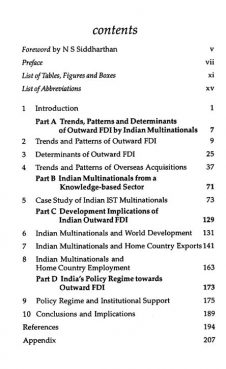Indian multinationals have been active in the world economy since early 1960s. However, their number and scale of operation have grown significantly in the last fifteen years or so. In the face of increasing global competition unleashed by extensive liberalization measures, Indian firms have adopted the strategy of Outward Foreign Direct Investment (OFDI) as an integral part of their business strategies. By undertaking Greenfield OFDI and Brownfield OFDI for acquiring foreign companies, Indian firms are enhancing their potential for growth and global competitiveness. Consequently, India has emerged as a major developing source country of FDI and Indian multinationals are likely to affect world development in several ways. The book analyses the phenomenon of Indian multinationals from both macro level factors and firm-level corporate strategies and examines its implications for India and host countries. A detailed investigation of Indian overseas investment flows and stocks from sectoral, regional, ownership and motivational perspectives provides a rigorous long-run coverage of Indian multinational firms from 1970s onwards. The role of innovation, entrepreneurial skills, scale of business, productivity, and government policies, received critical attention in explaining the emergence of Indian multinationals. The comprehensive quantitative and case studies approach offers valuable insights into the behaviour and impacts of these new global actors on home and host countries. This book offers a number of lessons to home country, host countries, and Indian enterprises becoming multinationals. With the growing global interest from policy makers, business practitioners, researchers, and students in Indian multinationals, this book would serve as an important and timely reading for all of them.
Industrialization, Economic Reforms and Regional Development
This book covers a wide ...
$31.50
$35.00









There are no reviews yet.